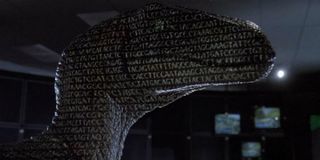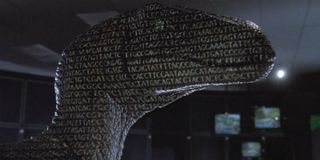Jurassic Park's Science Consultant Says We're Close To Being Able To Make Dinosaurs


Science has always maintained a vital role in the Jurassic Park franchise. Embracing the technical mumbo-jumbo inherent in Michael Crichton's original Jurassic Park novel, the series has consistently strived to find logical and rational explanations for how scientists could recreate prehistoric beings. However, now it looks like science has started to catch up with science fiction, as the scientific advisor behind the franchise now thinks human-made dinosaurs are not too far off.
This assertion comes courtesy of paleontologist Dr. Jack Horner (a significant source of inspiration for Sam Neil's Alan Grant), who has served as a longtime advisor for the Jurassic Park/World franchise. Now, with the genetics field making great strides in the years since Steven Spielberg's original film debuted back in 1993, Horner and his colleagues believe that we're close to learning how to construct our own dinosaurs. Rather than use old DNA from a mosquito encased in amber (which is how it works in the movies), Horner recently opened up to People and explained that we could potentially use bird DNA (as birds are the genetic descendants of dinosaurs) and manipulate the genetic code to create something resembling a prehistoric species.
Some significant leaps have already taken place in this field. Jack Horner and his colleagues have already managed to play with the DNA of a bird and turn its beak into something more reminiscent of a dinosaur snout, and other traits will follow suit as they make more progress on the projects. The tail is apparently the most difficult trait to manipulate in the DNA sequence, but Horner asserts that we may see a full-blown dinosaur created from chicken DNA within the next decade.
Of course, the increasing plausibility of this science brings reality closer and closer to the themes of the Jurassic Park franchise with each passing day. The dinosaur-centric series has long toyed with the ethics of bringing back creatures that died through the course of evolution and posed the question of whether or not we have a right to play god and bring them back. We have no reason to believe that these genetic experiments will lead to a real-life theme park that eventually goes awry, but this development definitely seems to show the prescience of the Jurassic Park and Jurassic World franchises.
Only time will tell if life will ever find a way and dinosaurs can return to the land of the living. For now, however, you can catch the cinematic dinosaurs when Jurassic World: Fallen Kingdom debuts in theaters this weekend on June 22. Check out our review for the latest Jurassic film, as well as our review roundup, and stay tuned for more updates related to anything and everything from the dino-themed franchise!
CINEMABLEND NEWSLETTER
Your Daily Blend of Entertainment News
Originally from Connecticut, Conner grew up in San Diego and graduated from Chapman University in 2014. He now lives in Los Angeles working in and around the entertainment industry and can mostly be found binging horror movies and chugging coffee.
Most Popular




